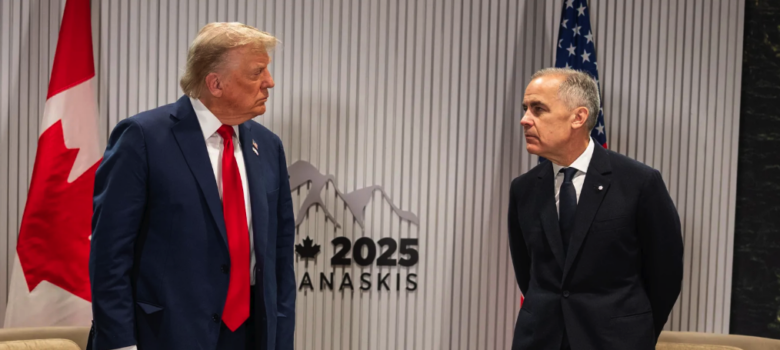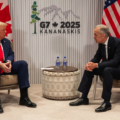After years of dismissing the warnings of likely retaliation, the Canadian government caved last night on the digital services tax. Faced with the prospect of the U.S. suspending trade negotiations, Finance Minister François-Philippe Champagne announced that the government would drop the DST altogether, payments scheduled for Monday would be cancelled, and legislation will be forthcoming to rescind the legislation that created it in the first place. Over the weekend, I wrote about the repeated warnings that the DST was a serious trade irritant with the U.S. that cut across party and presidential lines. While ignoring the risks was bad enough, I argued that Canada played its DST card too early. Rather than delaying implementation in the hopes of incorporating it into a broader trade deal with U.S., it marched ahead, leading to an entirely predictable response from U.S. President Donald Trump. That left Canada in a no-win situation: stick with the DST but face the prospect of higher tariffs or embarrassingly drop the DST (and $7.2 billion in revenue over five years) with only restarting negotiations that were on until government overplayed its hand to show for it.
It is hard to overstate how badly the government managed the DST issue over the past five years. It alienated allies by pushing ahead with the DST despite efforts at an international deal at the OECD, stood alone in rejecting an extension of a moratorium on new DSTs, made the DST retroactive which solidified opposition, and continually downplayed the concerns of successive U.S. Presidents and Members of Congress from both sides of the aisle. Meanwhile, when companies began passing along the costs of the DST to Canadian businesses, it did nothing. And when they urged the government to delay implementation to at least allow for the issue to be incorporated into a broader trade pact, it ignored the advice.
At every step, there were better options. This year, the likelihood that the DST would come to a boil was obvious to anyone who was paying attention. But rather than following the UK strategy, which managed to salvage a smaller DST (2% rather than 3%) as part of a bigger agreement that includes a commitment to support UK digital access to the U.S. market and to negotiate a larger digital trade deal, Canadian officials seemingly assumed that the U.S. was bluffing and would not retaliate.
If this sounds familiar, it is because the Canadian government misreading the tech sector has become a hallmark of its policy. Talk tough, practically dare companies and foreign governments to respond, and then frantically seek an exit strategy when they do. This was the case with the Online News Act and Meta’s blocking of news links, with the government’s AI regulation which new Minister of AI Evan Solomon says will not be re-introduced, with the online harms bill, and now with the DST.
Unfortunately, this misreading does not end there. The Bill C-2 lawful access provisions create significant new costs and scope in surveillance requirements that may place Canadian and foreign companies into legal quagmires where they cannot comply with both Canadian and U.S. laws. The opposition to the bill will grow in the fall until the government tries to find a way out. Further, last week, the government released a joint statement with the European Union that says Canada and the EU will “align our frameworks and standards in the regulatory field, to make online platforms safer and more inclusive, to develop trustworthy AI systems and to establish interoperable digital identities and digital credentials to facilitate interactions between our citizens and our businesses.” This suggests more of the same on online harms, AI regulation, and speech regulation.
There is a need for smart tech regulation in Canada. Unfortunately, the government has too often viewed tech primarily as a source of revenue for policy projects – the proverbial “make web giants pay” – while overestimating the attractiveness of the Canadian market and underestimating the risks of costly regulation. Canada desperately needs a tech regulation reset. Perhaps the embarrassment of walking away from $7 billion will provide the wake up call.









Yes, it is truly embarrassing.
Even outsiders and non-lawyers like me could see that the tax was just a cash grab, and that the absolutely batsh*t provision to make it retroactive was going to cause draw a response like this from the USA.
That it goes against an OECD decision means we don’t even really have a leg to stand on.
It just took common sense to see that this tax was a non-starter. Unfortunately, common sense was too much to ask from the previous government.
Pingback: US to resume trade talks after Canada ditches tax on tech giants | Canada - Chumzapp News
Pingback: व्हाईट हाऊस म्हणतो की कॅनेडियन पंतप्रधान ट्रम्प यांना टेक टॅक्स स्क्रॅप करण्याची मागणी कॅनडा – News Marathi – परखड, निर्भिड, सत्य
Pingback: White House says Canadian PM ‘caved’ to Trump demand to scrap tech tax – BNS Global News
Pingback: Canada pulls Digital Services Tax to avoid stalling US trade negotiations | BetaKit
Pingback: La Maison Blanche dit que le Premier ministre canadien a été «cédé» à la demande de la demande de la taxe technologique | Canada – Les Actualites
Pingback: La Casa Blanca dice que el primer ministro canadiense 'cedió' a Trump Demand to Scrap Tech Imprap | Canadá - Espanol News
Pingback: Gedung Putih mengatakan bahwa Perdana Menteri Kanada ‘memberi’ permintaan Trump untuk membatalkan Permprap Tech | Kanada – Kabar Nusantara
Pingback: Canadá extrae el impuesto de servicios digitales para evitar estancar las negociaciones comerciales de EE. UU. - Espanol News